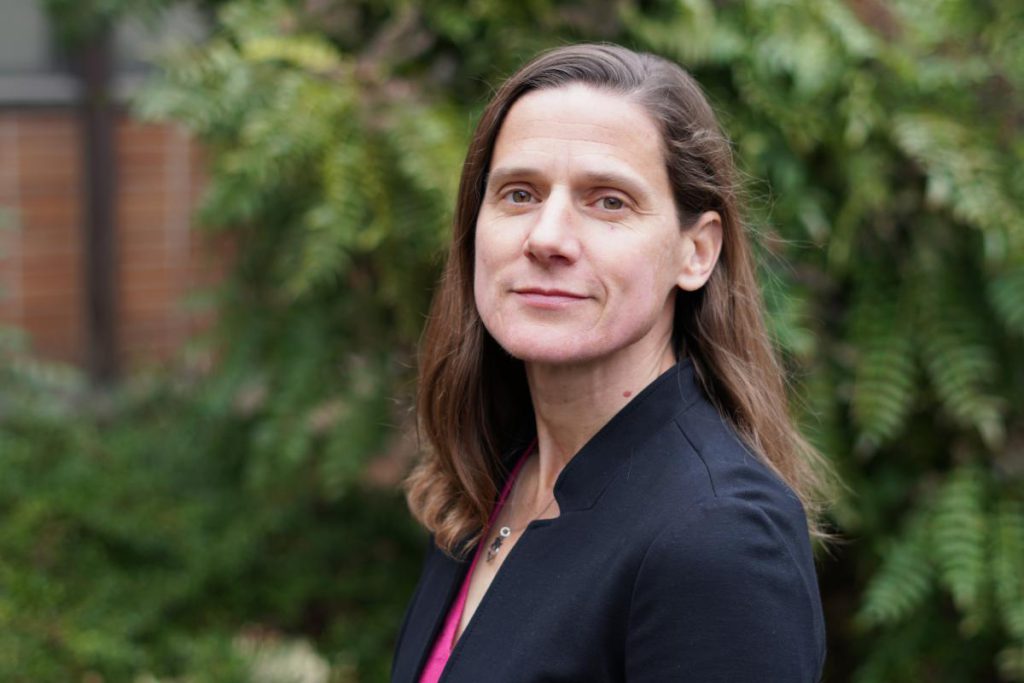
Anne Goodchild has led freight transportation research for nearly two decades and is an urban freight, international border, and port operations expert. At the University of Washington, she leads academic and research efforts in supply chains, logistics, and freight transportation as professor of civil and environmental engineering and as adjunct professor of industrial and systems engineering. She teaches transportation logistics and analysis, global trade, and transportation and logistics management, and advises graduate students in transportation engineering.
Goodchild is founding director of both the Supply Chain Transportation and Logistics master’s degree programs and the Supply Chain Transportation and Logistics Center. In 2016, the Supply Chain Transportation and Logistics Center launched the Urban Freight Lab to investigate cost-effective, high-impact solutions for businesses delivering goods in urban settings and cities trying to manage limited curb and parking space. The Urban Freight Lab uses a novel approach to research: public- and private-sector support to work collaboratively on shared goals.
“I like the challenge of translating among communities—whether students, research peers, public- and private-sector partners, administrators at the University of Washington, or people locally in Seattle who want to know what we are doing,” Goodchild comments. “It is an exciting intellectual challenge to translate what we are doing into their language, and to try to get people to communicate across environments.”
Goodchild’s research focuses on the intersection between supply chain management and freight transportation to better manage the delivery of goods and services, including evaluating the changing nature of e-commerce—in particular, how increased goods delivery may affect vehicle activity, carbon dioxide emissions, local pollutants, and vehicle miles traveled.
Goodchild has made significant contributions to transportation engineering in the United States and abroad and has been instrumental in bringing supply-chain concepts to freight model architectures. She has worked at the forefront of GPS data applications, identifying observable transportation characteristics that predict transportation behavior statistically. “I enjoy doing new things: building new ways of doing research, finding new spaces in research that are underserved, and thinking about why and whether I can take those on,” she notes.
Under Goodchild’s leadership, the Urban Freight Lab set two goals for the Final 50 Feet program: to reduce truck dwell time—that is, the time a truck is parked in a load–unload space in the city—and to reduce failed first deliveries. To meet these goals, Goodchild is studying common carrier parcel locker systems, which will allow carriers to leave packages in one secure, accessible area, as a way to create delivery density in a single location. The Urban Freight Lab recently led a pilot test of parcel lockers in an urban tower in downtown Seattle. The test—the first demonstration of a common carrier locker system in a public space in the United States—found that these locker systems could reduce total parcel delivery time by 78%, from 27 minutes to 5.6 minutes—and reduce the number of failed first deliveries to zero—compared with traditional delivery.
“In freight transportation, it is essential to work collaboratively with people who do that work—those who move freight or need freight moved—in order to do impactful, relevant research,” Goodchild observes. “I have tried to take on differences in culture, priorities, and objectives, and build those perspectives into my research.”
Goodchild has been active with TRB since 2001, when she was a graduate student at the University of California, Berkeley. In 2004, she joined the Freight Transportation Planning and Logistics Committee, which she served for nearly 10 years, including as committee secretary and paper review chair. She chaired the Intermodal Freight Transport Committee from 2013 to 2016. She also has served on National Cooperative Freight Research Program project panels, Second Strategic Highway Research Program expert task groups, and policy study committees. In 2016, Goodchild became chair of the Freight Group and in that position served on the Technical Activities Council.
“There are very few unbiased voices in delivering a transportation system; the city, the port, transportation consultants, and private companies each have their own perspectives,” she adds. “To me, being a researcher means being a voice for the entire region. As researchers, our job is to provide accurate data, consider all stakeholders’ perspectives, and honestly characterize the trade-offs. Where would we be if we didn’t have anyone to play that objective role?”
Goodchild muses that her aim is to conduct relevant research—and not to shy away from the practical and sometimes tedious challenges of trying things on the ground: “As academics, we can sometimes hide in our models. When what we study is a real system that is implemented daily, we have to tackle those implementation challenges to get to solutions, and I want to incorporate that into my research.”